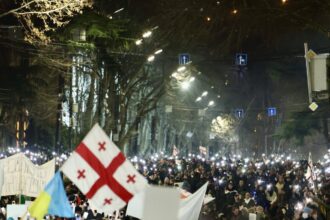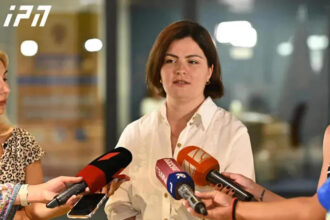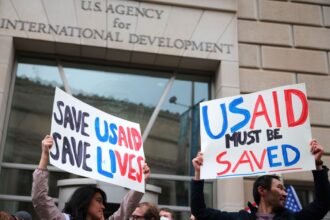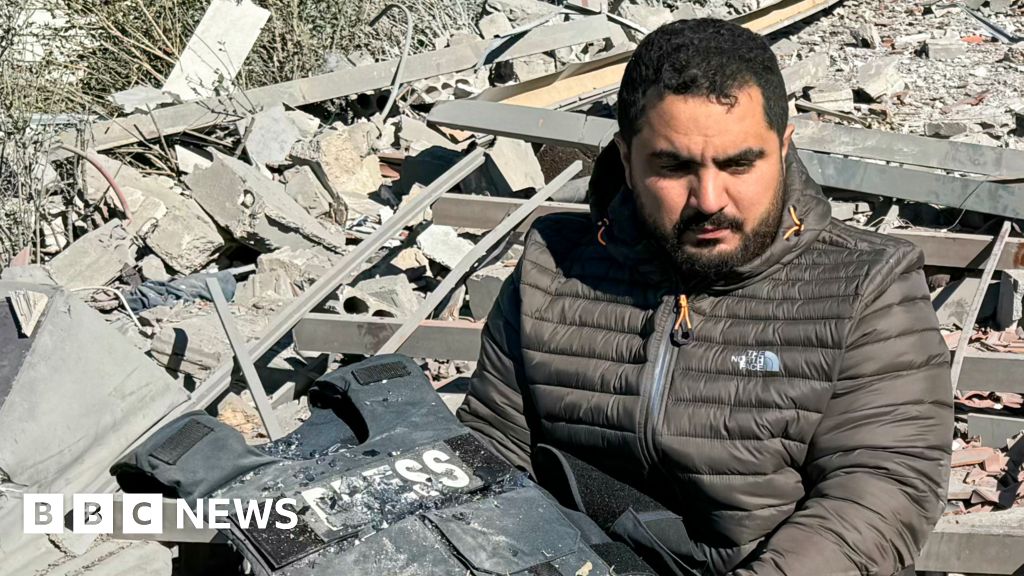BBC reported that three Lebanese reporters were killed in an Israeli airstrike on a building in the south-east of Lebanon where it was known to house journalists.
The attack took place on a guesthouse located in a compound near Hasbaya, which was used by at least seven different media organisations. A courtyard contained cars with the words “press” clearly displayed.
The broadcasters Al-Manar TV (Al Mayadeen TV) and Al-Manar TV (Al-Manar TV) released statements to pay tribute to their employees who were killed.
Lebanon’s Information Minister said that the attack was deliberate, and called it a “warcrime”.
The Israeli military claims it targeted a Hezbollah building, but is still reviewing the incident.
The victims were cameraman Ghassan Najir and engineer Mohamed Reda of the pro-Iranian Al Mayadeen news channel, as well Wissam Qassem of Al-Manar, which is affiliated with Hezbollah.
Three other people were also injured, according to the Lebanese Ministry of Health.
Five journalists, including Reuters journalist Issam Abudallah, had been killed by Israeli strikes in Lebanon in the past.
Al-Jadeed TV, whose journalists shared the house with them, broadcast footage of a bombed-out structure with a collapsed rooftop and floors covered in debris.
Satellite dish of a vehicle used to broadcast TV was mangled by cables near the vehicle.
“All official parties have been informed that this house is being used as a journalist’s stay-house.” “We coordinated with them all,” said an Al-Jadeed reporter, caked in dust from concrete, in a live broadcast, panting and coughing.
As the situation in Marj’youn became too dangerous, journalists from Lebanon covering the conflict south of the country were forced to move to Hasbaya.
In a statement issued hours after the incident Israel Defense Forces (IDF), said that they had struck an Hezbollah structure in Hasbaya where “terrorists” were operating.
The force said that the incident showed “that proximity to terrorist infrastructure poses a risk”.
The statement continued: “Several hours later, we received reports that journalists were injured during the strike. The incident is being reviewed.”
Youmna Fawaz, a reporter from broadcaster MTV Lebanon told the BBC that the strike woke up journalists in the compound at around 03.00 local time (01:00 BST).
She said that the ceilings had collapsed on them and they were surrounded with dust and rubble, with fighter jets flying overhead.
She said that each news organisation had its own building within the compound. The building housing Al Mayadeen journalists was “obliterated”, while Al-Manar staff were inside.
Ms Fawwaz claimed that it was a media complex known as such by both Israel and Hezbollah.
“The airstrike had been carried out deliberately.” Everyone knew we had arrived. All the cars had labels that said “press and TV”. “We weren’t given a warning.”
She added: “They try to terrorise us like they do in Gaza.” Israelis are trying prevent us from reporting the story.”
The information minister of Lebanon accused Israel of targeting journalists in violation of international law.
Ziad Makary posted on X that “the Israeli enemy waited until the journalists’ nighttime breaks to betray them while they slept.”
This is an assassination that was planned and designed in advance, after monitoring, tracking and planning. There were 18 journalists present, representing seven media organizations.
Hasbaya is about eight kilometres (five miles) from the Israeli border and is home to Muslims, Christians, and people of the Druze ethnicity.
In recent weeks, there have been attacks on its perimeter but this is the first attack on the settlement itself.
The attack is part of a larger conflict in Lebanon where Israel has intensified air strikes and launched a ground invasion in border towns and villages to the south.
After Israeli forces fired on an observation post in Zahajra in the south-west earlier this week, UN peacekeepers were forced to withdraw their troops from that area.
Unifil has accused Israel several times of targeting its bases in recent weeks and causing injuries to peacekeepers. Israel denies that and has blamed past incidents on clashes between Hezbollah fighters in the area.
Israeli military confirmed that it had attacked the Jousieh crossing between Syria and Lebanon in the northern Bekaa region overnight, which it said Hezbollah forces and Syrian security forces were using to smuggle arms.
In the last three weeks, the Lebanese authorities recorded more than 1,700 airstrikes across the country.
Hezbollah and Israel began fighting on 8 October, one day after Hamas attacked Israel, killing around 1,200 people. Since then, the Iran-backed armed groups has been firing drones and rockets into Israel as part of its “solidarity” campaign with Palestinians living in Gaza.
According to the health ministry, nearly 2,600 people have died in the current conflict in Lebanon. Many of these deaths occurred since Israel escalated its attacks on the 23rd September.
Around 60,000 people have been displaced in northern Israel by Hezbollah’s rocket fire. The Israeli government has declared that returning them to their home is a priority.
According to a statement by the Israeli foreign ministry, two people were killed in a Hezbollah missile attack on Majd al-Krum in Israel’s north.
Satellite imagery examined by BBC in southern Lebanon shows that Israel’s intensified bombardment campaign has caused more building damage in two weeks than it did during a year-long cross-border conflict.
Data shows that between 2 and 14 Oct, more than 3,600 buildings were damaged or destroyed in Lebanon – approximately 54% of total damage.
The Israeli military had accused six Al Jazeera reporters working in northern Gaza that they were affiliated with Hamas and other armed Palestinian groups.
The Qatari broadcaster denied and “vehemently condemned” the allegations.
According to the Committee to Protect Journalists (CPJ), at least 123 Palestinian media workers and journalists have been killed since Israel began a war on the territory last year.
Gaza’s Hamas run health authority has reported that more than 42,000 deaths have occurred since.
Two Israeli journalists were also killed in the conflict.
Rawad Salameh: Additional Reporting
Read More @ www.bbc.com




